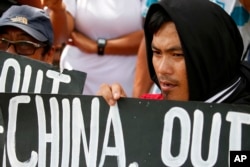Foreign policy analysts remain skeptical about the agreement between China and Southeast Asian nations to officially start negotiations on a legally binding code of conduct to resolve disputes in the South China Sea.
Leaders of the Association of Southeast Asian Nations (ASEAN) and Beijing announced their intention to begin talks during the 20th annual summit in Manila on Monday. The move comes 15 years after the adoption of loose guidelines for actions in the contested sea that are now largely seen as ineffective.
Beijing claims more than 90 percent of the 3.5-million-square-kilometer South China Sea, including smaller tracts that Brunei, Malaysia, Vietnam, Taiwan and the Philippines say fall under their own flags.
While the United States has consistently encouraged ASEAN and China to find a way to avoid conflict in the South China Sea, Washington appears to be cautious about the latest development.
"We understand that ASEAN and China have not agreed on the text of a code of conduct, but on an initial framework describing how such a document might be structured. As we have not seen that text, we are not in a position to comment on it," State Department East Asia and Pacific Bureau spokesperson Aaron Tarver told VOA on Tuesday.
Territorial disputes
For years, Washington has called for a legally binding mechanism to prevent conflicting territorial claims in the South China Sea from erupting into violent confrontations.
"A meaningful and effective code of conduct would build upon the useful existing framework of the Declaration of Conduct, would be compatible with international law, in particular as reflected in the Law of the Sea Convention, would promote behavior essential to maintenance of peace and stability, and would promote accountability for actions inconsistent with signatories' commitments," Tarver said.
Chinese Foreign Ministry spokesperson Geng Shuang said on Tuesday that "based on the work program every party has agreed, next year, China and ASEAN countries will carry out intense consultations on the text of the code of conduct."
In 2002, China and the Southeast Asian bloc signed a non-binding "Declaration on the Conduct of Parties in the South China Sea," also known as DOC.
ASEAN Secretary General Le Luong Minh said the declaration that set loose guidelines for actions in the disputed waters has proven to be ineffective, with tensions frequently rising over land reclamations and maritime activities.
"For 15 years since we have had the DOC, what have you seen on the ground? What have you seen at sea? We have seen any kind of tension," Minh, a veteran Vietnamese diplomat, told reporters on Tuesday in Manila.
Regional experts say they remain doubtful the latest diplomatic language will mean progress in resolving South China Sea disputes.
"Recall that ASEAN and China have been having official consultations on the [code of conduct] for several years, to no effect," said Gregory Poling, director of the Asia Maritime Transparency Initiative at the Center for Strategic and International Studies.
"How would they cooperate on fisheries, oil and gas? Where will it apply? How will enforcement be managed?" asked Poling, adding Beijing's message is that it will talk about the code of conduct as long as ASEAN wants but it has "no intention of signing a robust and enforceable agreement."
China's intentions
Atlantic Council senior fellow Robert Manning told VOA on Tuesday that a serious code of conduct should call for a freeze on any new construction and should be binding, but China is unlikely to accept that.
"China calculated that the U.S. will not start a war over reefs and atolls in which it has no claim and to defend sea lanes that are not threatened in peacetime," said Manning. "Based on that, they did their land reclamation and military base building."
He added China has seemingly bought the support of ASEAN nations one by one, whether it be through aid packages for the Philippines, or with arms sales to Thailand and Malaysia.
"So far, their strategy appears to be working," Manning said.
For its part, China has pushed back on criticism of its activities, with officials saying the situation in the South China Sea is "generally improving."
"We believe that regional countries have the aspiration, wisdom and capacity to properly deal with the South China Sea issue," said Chinese Foreign Ministry spokesperson Geng. "Meanwhile, we hope that countries outside the region respect the efforts made by regional countries."
U.S. push for resolution
For years, contrary to China's preferences, the United States has called for a legally-binding code of conduct, saying such a mechanism is necessary to ease tensions over competing claims in the South China Sea.
U.S. President Donald Trump said he supported "the expeditious conclusion of an effective and binding code of conduct" in the South China Sea, in a joint statement with visiting Singapore Prime Minister Lee Hsien Loong in late October.
And although the U.S. is not a claimant to the sovereignty over disputed islands in the South China Sea, Washington said it is vital to its national interests that various claimants pursue their claims peacefully.
In prepared remarks to Southeast Asian leaders on Tuesday, Trump said he remains "concerned about China's efforts to build and militarize outposts in the South China Sea."
"Ensuring regional security will also require all nations to respect freedom of navigation and overflight, and other lawful uses of the sea."











